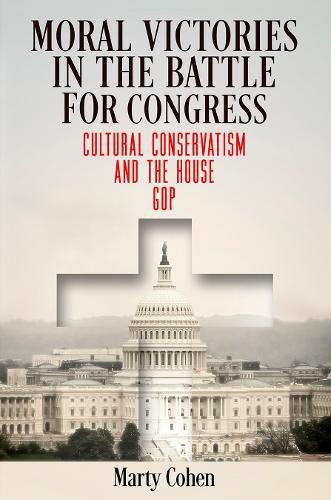Readings Newsletter
Become a Readings Member to make your shopping experience even easier.
Sign in or sign up for free!
You’re not far away from qualifying for FREE standard shipping within Australia
You’ve qualified for FREE standard shipping within Australia
The cart is loading…






While Christian conservatives had been active in national politics for decades and had achieved a seat at the table by working with the Republican Party, the 1980s and 1990s saw them make significant strides by injecting issues of moral traditionalism into U.S. House races across the country. Christian conservative activists worked diligently to nominate friendly candidates and get them elected. These moral victories transformed the Republican House delegation into one that was much more culturally conservative and created a new Republican majority. In Moral Victories, Marty Cohen seeks to chronicle this significant political phenomenon and place it in both historical and theoretical contexts. This is a story not only of the growing importance of moral issues but also of the way party coalitions change, and how this particular change began with religiously motivated activists determined to ban abortion, thwart gay rights, and restore traditional morality to the country.
Beginning in the early 1980s, and steadily building from that point, religious activists backed like-minded candidates. Traditional Republican candidates, more concerned about taxes and small government, resisted the newcomers and were often defeated. As a result, increasing numbers of House Republican nominees were against abortion and gay rights. Voters responded by placing moral issues above their interests in economic policies, which led to the election of ever more socially conservative representatives. As a result, the House Republican caucus evolved from a body that advocated largely for low taxes and small government to one equally invested in moral and social issues, especially abortion and gay rights. The new moralistic Republican candidates were able to win in districts where traditional business Republicans could not, thereby creating the foundation for a durable Republican majority in the House and reshaping the American political landscape.
$9.00 standard shipping within Australia
FREE standard shipping within Australia for orders over $100.00
Express & International shipping calculated at checkout
While Christian conservatives had been active in national politics for decades and had achieved a seat at the table by working with the Republican Party, the 1980s and 1990s saw them make significant strides by injecting issues of moral traditionalism into U.S. House races across the country. Christian conservative activists worked diligently to nominate friendly candidates and get them elected. These moral victories transformed the Republican House delegation into one that was much more culturally conservative and created a new Republican majority. In Moral Victories, Marty Cohen seeks to chronicle this significant political phenomenon and place it in both historical and theoretical contexts. This is a story not only of the growing importance of moral issues but also of the way party coalitions change, and how this particular change began with religiously motivated activists determined to ban abortion, thwart gay rights, and restore traditional morality to the country.
Beginning in the early 1980s, and steadily building from that point, religious activists backed like-minded candidates. Traditional Republican candidates, more concerned about taxes and small government, resisted the newcomers and were often defeated. As a result, increasing numbers of House Republican nominees were against abortion and gay rights. Voters responded by placing moral issues above their interests in economic policies, which led to the election of ever more socially conservative representatives. As a result, the House Republican caucus evolved from a body that advocated largely for low taxes and small government to one equally invested in moral and social issues, especially abortion and gay rights. The new moralistic Republican candidates were able to win in districts where traditional business Republicans could not, thereby creating the foundation for a durable Republican majority in the House and reshaping the American political landscape.